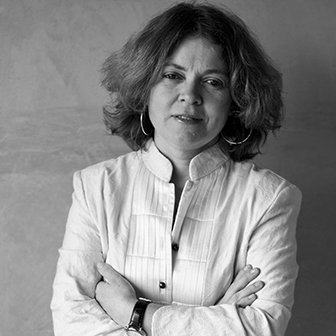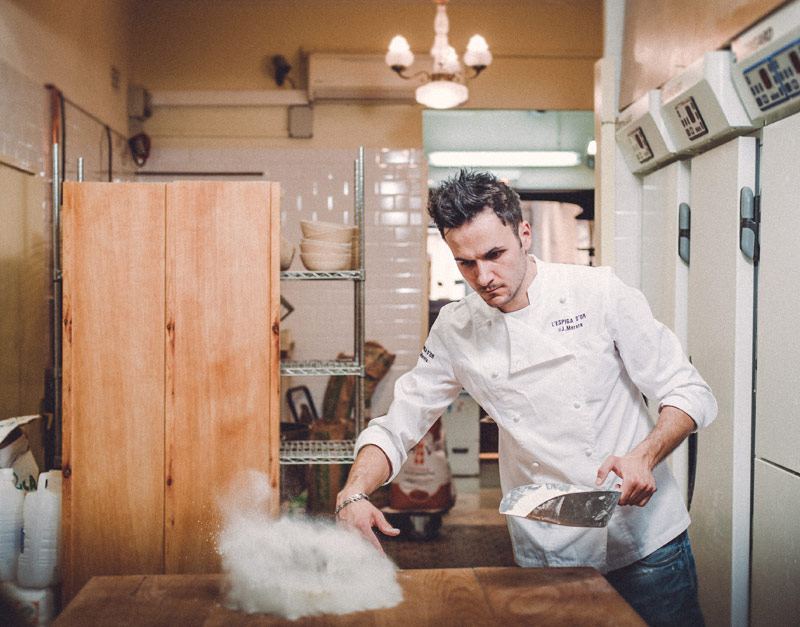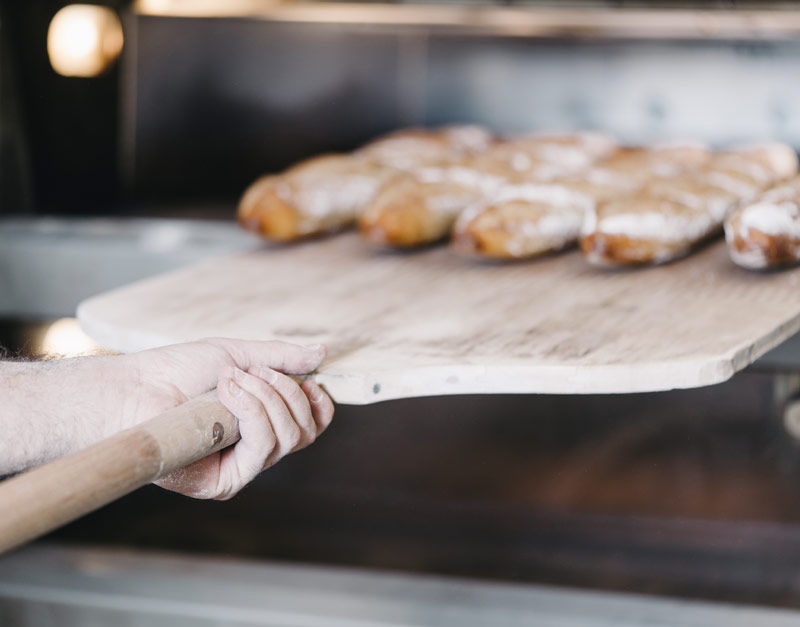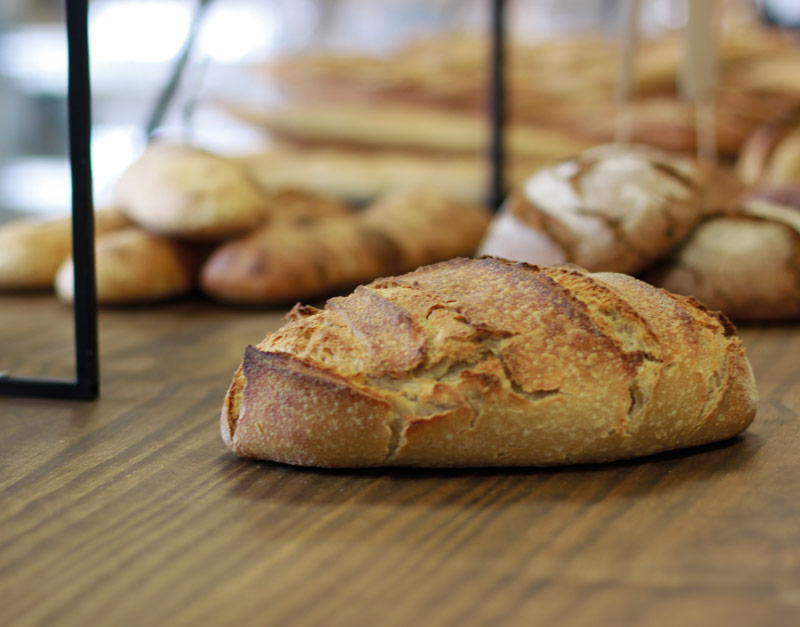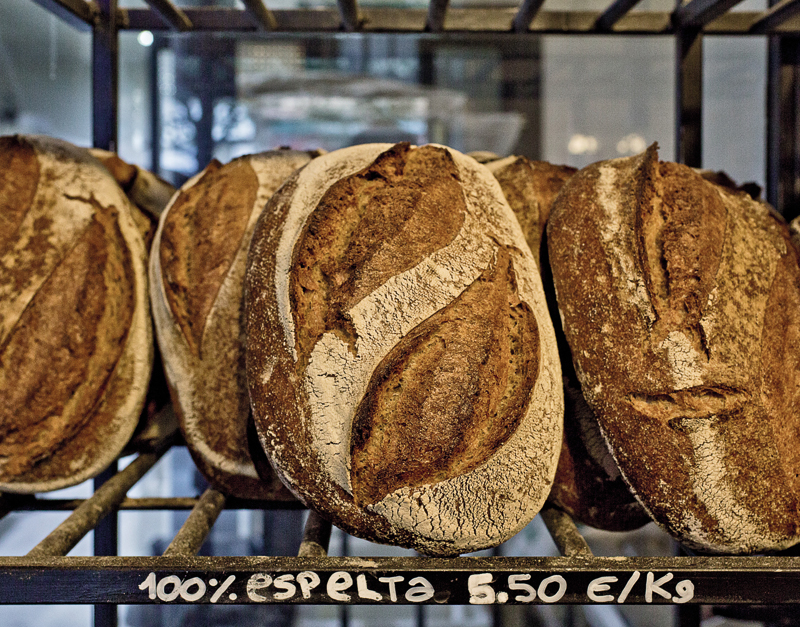Mistreated by diets, industry and modern life, bread –real, crafted, traditional, ecological or creative bread– is making a comeback. Now a batch of enthusiastic young bakers have recovered bread’s true virtues and taste.
Bread, the staff of life, has been reborn, with bread-making courses, tastings, and new bakeries offering time-honoured varieties made with sourdough and the stone-ground flour of all but extinct cereals. Bread has even won itself a place in haute cuisine and the best restaurants pair their dishes with just the right types.
Indeed, bread has made a round-trip journey. Modern life filled people’s homes with industrial sandwich bread and frozen loaves. The journalist and bread expert Ibán Yarza says “bread served warm at home at any time of the day seems to be a great idea. It appears to be fresh-baked but its warmth conceals its tastelessness”. Yarza holds courses all over Spain and has published his own manual, Homemade Bread (Larousse, 2013). He has also created food-lover forums and is one of the people behind the growth in the number of our country’s ‘bread fanatics’. “My courses are always a big success because people are really eager to do things with their hands in today’s technological world”.
Ibán Yarza’s passion for bread led him on a journey across Spain to document the breadmaking process in village bakeries, which are tending to disappear because of a lack of successors. This Herculean task cost him many a sleepless night, observing the people at work in bakeries throughout the country. He has presented this experience in his book Village Bread (Grijalbo, 2017), which is full of stories about Spain’s bakers and their overwhelming diversity of breads: rosca, hogaza, mollete, bollo, bica, pan de moños, lechuguino, talo… Yarza says sadly: “the rural world is vanishing and so is village bread. A bakery in Toledo closed down four days before I got there and they saved the last loaf for me so I could take a picture of it”.
Fortunately, “gastronomy is in fashion and now there’s a rebirth of bread underway here, a process that began some years ago in countries like England and the United States”. Young highly-trained bakers have recovered natural processes and use technology to make bread like it was in the past or even better. Sometimes they belong to the fourth or fifth generation of families devoted to this craft, while others who were simply fond of making bread at home decided to turn their passion into a profession, opening bakery shops in Madrid or Barcelona to share their crafted loaves. And they’ve been quite successful.
A few names stand out in particular in this revolution, like those of Xavier Barriga (Turris), Anna Bellsolà (Baluard) or Jordi Morena (L’Espiga d’Or) in Barcelona; Tomeu Arbona (El Fornet de la Soca) in Mallorca, and Beatriz Echevarría (El Horno de Babette) or Javier Marca (Panic) in Madrid, and in many cases they supply bread to Michelin-starred restaurants. In addition to being excellent bakers, they are good communicators in the social networks and they publish manuals and hold courses to reveal the secrets of sourdough, fermentation and flours. “Until not long ago, —Ibán explains—, most courses were held by manufacturers of bread improving agents: additives that boost the speed with which dough rises or its workability to produce good-looking bread. But now bakers are being trained better than ever and today’s top breads are the best that have ever existed”.
To judge bread, Yarza says you should buy it as if you were blindfolded in order not to be misled by its appearance and then “taste it without toasting it or spreading butter or tomato on it. Bread should have the taste and aroma of... bread! It’s as easy as that. So don’t look... just taste and smell!”.
Bakers 2.0
Wheat, rye, corn, oat, buckwheat, spelt, bread-wheat… White flour has been over-rated for decades but the new bakers are bringing back flours that are very little refined, ecologically produced and stone-ground. Jordi Morera, who belongs to the fifth generation of bakers at L’Espiga d’Or (Vilanova i la Geltrú, Barcelona Prov.), joined the bakery after obtaining his university degree and went on to recover his family’s wood oven, built during the Spanish Civil War. He has recently published The Bread Revolution (Montagut Editores, 2017), a compendium of bread-making philosophy and technique. His goal is “to make bread that’s great to eat and great for your health”, basing his products on natural sourdough, long slow fermentations at mild temperatures, and a crafted process respecting the pillars of ‘slow food’: proximity, sustainability and ecology. In addition to promoting the bread-lovers’ forum culturadelpa.com and holding classes for professionals, Morera shares bakers’ everyday concerns on the social networks. “We bakers are small fry and don’t have much pull so all we can do is tell our story”.
“Actually, more than ‘revolution’, I look at things in terms of evolution”, says Morera. Now we’ve got science, we know why things happen and we have technology to help us. He advocates a “wild breadmaking scenario” in which “bakers will finally forget all about chemistry and use natural processes and stone-ground flours to make bread that really meets the expectations of today’s consumers”.
Jordi gives us the keys to recognizing good bread: “You should ask the baker where and how his bread is made”. He agrees that it’s not a good idea to judge a bread by its appearance: “It should have weight, it should make a statement, and its crumb should be moist and a bit rubbery. The crust should be crisp, even though crafted breads often have thick ones. There should be something tart to its flavour and it should have character resulting from a long fermentation. And it should keep – quality bread should stay good for three or four days”.
He sees bread as a sensory thing, a healthy food with added value. “If you work with wheat from the other side of the world, you’re leaving an enormous carbon footprint. But if you use stone-ground grain from your own area, you’re making a sustainable product that helps to create jobs for people and to restore the local environment”.
The best bread in Palma
At the Fornet de la Soca, Tomeu Arbona engages in “gastronomic archaeology”, recovering Mallorcan baking recipes and forgotten flavours. He makes rolls —like llonguets or Vienna bread— as well as traditional bread with sourdough and stone-ground ecological flours that often made from recovered cereal varieties. At Plaça del Bisbe Berenguer Palou, an Ecological Market is held on Saturday mornings with the participation of artisanal bakers like Tomeu Morro, of Arc al Cel, who makes wood-oven baked xeixa bread-wheat, kamut and spelt bread using sourdough; and Pane Nostro, which features ecological gourmet breads of rye, spelt, flax and durum. The “Pa d’aquí” sign identifies over 200 traditional bakeries that make their own products, including establishments like La Glòria, Santo Cristo, Forn Sant Francesc, La Mallorquina and Ca sa Camena.
Pa moreno, llonguets and galetes d'oli
The traditional bread in Mallorca is pa de pagès, a round salt-free loaf that may be white or brown depending on the flour used to make it, although the brown (moreno) variety is most highly esteemed. It is unmistakable with its dark crumb and thick crust that makes it so long-lasting, and it is indispensable for pa amb oli, which is sliced bread rubbed with tomato and sprinkled with olive oil and salt, accompanied by charcuterie or cheese. Typical in Palma are llonguets, which are tender rolls that are filled like sandwiches and which have inspired such events as the Llonguet Fair —which takes place each April in El Pil·larí— and the Llonguet Route, in which several Palma bakeries offer llonguets and a beverage at attractive prices each Wednesday between July and October. Another typical food is the galleta d’oli, a crispy ‘olive oil biscuit’ that is tasty at any time of the day and which was originally made as a long-lasting substitute for bread on ships.

